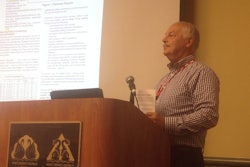A Recommended Practice (RP) update under consideration by the Technology & Maintenance Council (TMC) of American Trucking Associations is looking at the driver’s impact on fuel economy.
Task force chairman Gary Strausbaugh, vice president of transportation at Mennel Milling Co., shared comments at the TMC Fall meeting Monday morning in Orlando, Fla.
The RP currently lists four key ways: horsepower demand, idle time, vehicle speed, and brake use.
The update looks at how newer technologies on the truck can be used by the driver to more effectively impact fuel savings.
Aaron Peterson, chief engineer for fuel economy at Navistar, says maximizing fuel gains comes down to driver training, and ensuring they know how to properly use all the technologies at their disposal.
“The biggest varibale you have is that driver,” Fritz Marinko, vice president of special accounts for ATDynamics, says. “The better you train that driver, the more benefit you’re going to get.”
Updates to RP1114 has already gone to ballot with 31 yes votes and zero opposed.
Additional comments include to consider setting RPS in a lower ECM parameter and training on low RPM/high torque engines.










